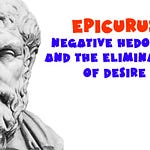Paid subscribers will have access to this and all other videos and bonus content. Please consider upgrading to a paid subscription to enjoy and support this project. If you pay to subscribe I’ll also read your name out at the end of the video.
You can also obtain the benefits of a paid subscription by sharing Three Minute Philosophy with others. For each new friend you bring in, you earn benefits. So spread the word!
For the full archive of videos so far, visit https://www.speterdavis.com/philosophy/
Xenophon was a Greek military leader who lived around 450 BC and became known as one of classical Greece’s greatest political philosophers.
Political philosophy is similar to ethics in some ways but where ethics thinks about the ways individuals behave or should behave, political philosophy thinks about the ways that society behaves or how it should best be organized.
Xenophon was a student of Socrates but he made the unusual decision of choosing a life in the military rather than sitting around and asking questions about things. But the combination of military experience and a Socratic education put Xenophon in a good position to travel the world examining different nations and writing about their different political structures.
Back in those days there wasn’t actually any country called “Greece,” it was a region containing several independently governed city states, and they all had a different system of government. Athens, where Xenophon came from, was famously a type of democracy, but Xenophon didn’t spend much time writing about it because he was much more interested in systems with strong autocratic leaders, such as Persia and Sparta.
Xenophon’s reputation in the Athenian army was so great that he was talent scouted by the Persian prince Cyrus the Younger, who was building an army to help him overthrow his brother the King.
That campaign didn’t go very well, but it nevertheless resulted in Xenophon developing a powerful admiration for Cyrus. He saw Cyrus as an exemplary leader, and in fact his campaign to overthrow the Persian king was well on track to be successful. The only reason it failed was because Cyrus accidentally got knocked off his horse and died. Since the entire point of the invasion was to install Cyrus as King of Persia, there was really no reason not to just go home.
But now that they were leaderless and stuck in enemy territory Xenophon assumed control of the army himself. He saw a lot of similarities between running a military and running a country, and he appreciated political systems that were militaristic and whose leaders ruled like generals. Xenophon found what he thought was a perfect example of this when he moved to Sparta.
Unlike Athens, Sparta operated as an absolute monarchy, but it wasn’t as simple as one guy being allowed to do what he likes while harvesting all the tax money. Life in Sparta was regimented right down to the smallest detail, and there were rules governing everything from what time you were allowed to eat dinner or go to bed to whether you were allowed to lend another man your horse.
But the Spartans didn’t think of themselves as slaves. As well as being authoritarian, Sparta was also egalitarian. Everyone was the same, at least allegedly, and nobody had a higher or lower status than anyone else, not even women, which was pretty unusual for the time period.
So even though they had an absolute monarch, the society of Sparta was essentially collectivist as the laws, strict as they were, we socially enforced. They didn’t need a police force because the entire citizenry was also the military. Basically, everyone was a cop.
Xenophon admired this. He believed that the ideal political structure is one with an absolute ruler whose power is earned through exemplary behaviour. Like a good military commander, the citizens want to follow orders because of how much they admire their leader. In turn, it’s the responsibility of the society to keep the leader happy so that he can lead properly, and in an ideal society they will want to do so.
Xenophon’s ideal political structure can possibly best be described as a happy tyranny.
Although Xenophon was considered one of the most important political writers of the ancient world his philosophy doesn’t get brought up a lot in modern philosophy classrooms, perhaps due to the sketchy stuff it’s been used to justify. Xenophon was one of the primary influences of Machiavelli and more notably the Founding Fathers of the United States who used it as the philosophical justification for, well, the American slave system, with its dubious notions of benevolent masters and happy slaves.
Considering that “Sparta” isn’t exactly what you think of when you picture antebellum Georgia it’s safe to assume this isn’t exactly what Xenophon was going for.
Sources:
Newell, Walter R., Tyranny: A New Interpretation. Cambridge University Press, 2024.
Browning, Eve A., Xenophon (430—354 B.C.E.). Internet Encyclopedia of Philosophy, accessed December 2024.
Atack, Carol., New Surveys in the Classics , Volume 48: Xenophon. Cambridge University Press, 2024.
Hobden, Fiona. Xenophon. Bloomsbury Academic, 2020.
What you get for subscribing:
Three Minute Philosophy is a fun and educational series of videos and essays about the history of philosophy.
Essays are free. Paid subscribers will gain access to full videos, printable PDFs, and possibly more in time.
Listen to this episode with a 7-day free trial
Subscribe to Three Minute Philosophy to listen to this post and get 7 days of free access to the full post archives.










